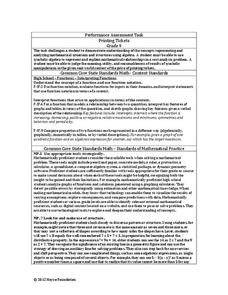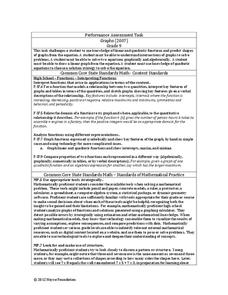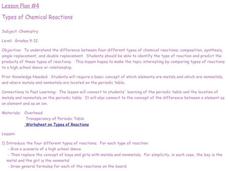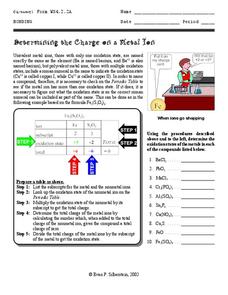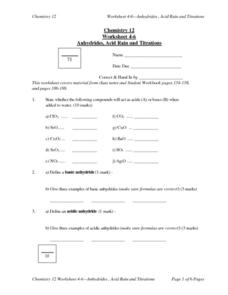Curated OER
Covalent Bonds
After a short introduction, chemistry aces get right into drawing electron dot diagrams for covalent bonds. There are only three questions to answer, so this is not a comprehensive instructional activity. It can be used when introducing...
Inside Mathematics
Printing Tickets
Determine the better deal. Pupils write the equation for the cost of printing tickets from different printers. They compare the costs graphically and algebraicaly to determine which printer has the best deal based upon the quantity of...
Inside Mathematics
Graphs (2007)
Challenge the class to utilize their knowledge of linear and quadratic functions to determine the intersection of the parent quadratic graph and linear proportional graphs. Using the pattern for the solutions, individuals develop a...
Inside Mathematics
Quadratic (2009)
Functions require an input in order to get an output, which explains why the answer always has at least two parts. After only three multi-part questions, the teacher can analyze pupils' strengths and weaknesses when it comes to quadratic...
Curated OER
One for the Money
Eighth graders sort items as they are shown one at a time by the teacher. They attempt to identify the one physical trait the teacher is looking for (metal and not metal). After several objects have been shown and placed in groups, the...
Curated OER
Chemistry: Balancing Chemical Equations
Eighth graders practice balancing chemical equations. In this chemistry lesson plan, 8th graders explain why it is necessary to balance equations. They complete practice worksheets individually.
Curated OER
Gopher, Part 2: Gopherin'
Students explore how to access a gopher site using a root menu. Several options are presented with their definitions and the fastest routes examined in this lesson. The lesson is designed for librarians with little or no net experience.
Curated OER
Enslaved and Running
Young scholars use runaway slave advertisements to discover how the language varies from the 18th to 21st century. Using primary source documents, they research the brutality of slavery and the desire of those in slavery to be free. ...
Curated OER
Electron Arrangements
Pupils write electron configurations and identify groups. In this investigative instructional activity students use valence electrons to draw electron dot structures.
Curated OER
Types of Chemical Reactions
Students understand the difference between four different types of chemical reactions: composition, synthesis, single replacement, and double replacement and identify the type of reaction and predict the products of these types of...
Curated OER
The Atom Board-Making Atoms
In this making atoms science worksheet, students read about the atomic number of protons, finding the number of neurons, and how electrons function before they complete the atom board graphic organizer and respond to 4 short answer...
Curated OER
Exploring Atoms
In this chemistry worksheet, students complete 29 fill in the bank questions about atoms based on the movie Exploring Atoms from the website www.brainpop.com .
Curated OER
Chemical Equations
In this chemical equations worksheet, students fill in the blank with information about how to form chemical equations using the "ide" rule and the "ate" rule.
Curated OER
Changes in Nature
Fifth graders explore changes in nature. They identify chemical and physical changes in the water cycle, carbon cycle, and weathering. Students explore a chemical or physical change based on a chemical formula. They examine the effects...
Curated OER
Using the Stock System
In this compounds worksheet, students learn the rules for naming compounds, the stock system. Students apply these rules by writing the names or formulas for the 20 given compounds.
Curated OER
Determining the Charge on a Metal Ion
In this metal ion worksheet, learners follow the steps to determine the oxidation states of the metals in each of the given compounds. Students complete 10 problems.
Curated OER
Chemistry: Metals and Non-Metals
Students conduct an experiment to test the reactivity of metals and non-metals. In this chemistry instructional activity students test metals with different chemicals to observe the reaction. The results are used to categorize the metals.
Curated OER
CAN'T TOUCH THIS!
Young scholars discover the best practical shielding material when dealing with radioactive substances. They draw conclusions based on availability of materials, price, and best shielding properties.
Curated OER
Poster Assignment: Sports Chemistry
Tenth graders distinguish between chemical and physical properties and changes in matter when given specific examples. They view a video of sports activities. Students chose their favorite sport and design an experiment to improve sports...
Curated OER
Creating Atoms
In this creating atoms worksheet, learners follow directions by creating atoms out of cotton balls, beads, and pipe cleaners. Students then answer 2 questions.
Curated OER
The Connection Between Pigment and Light Colors
Young scholars explain the mole concept and use this concept to prepare chemical solutions of particular molarities.
Curated OER
Metalloids
Pupils discuss metalloids, their use as semiconductors, and their impact on the computer industry. They work in groups to create a visual timeline showing the evolution of the computer.
Curated OER
Anhydrides, Acid Rain and Titrations
In this chemical compounds worksheet, students determine is compounds will act as acids or bases when added to water. Students compare basic, acidic, and amphoteric anhydrides. This worksheet has 15 fill in the blank, 2 short answer...
Curated OER
Help Wanted: A Lighting Engineer For Popular Rock Group
Students are assigned to groups, and determine each member's role in the group. They will design an experiment to determine a way to produce the three primary and five secondary colors. Students discuss color and mood. They listen to a...
Other popular searches
- Table of Periodic Elements
- Elements of the Periodic Table
- Elements and Periodic Tables
- Elements Periodic Table
- Elements on Periodic Tables
- Periodic Table Elements Unit
- Elements in the Periodic Table



